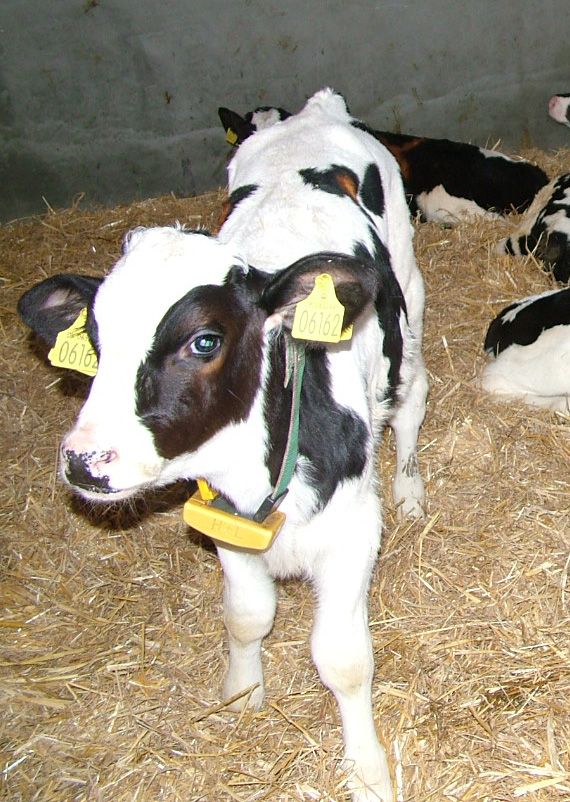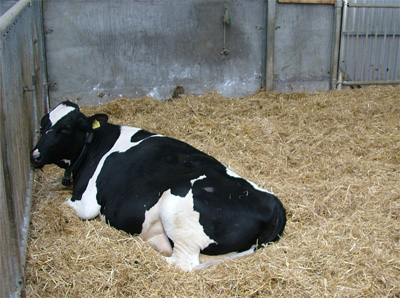Better cow and calf welfare the core of new project
Scientists at the Department of Animal Science, Aarhus University, will compare the welfare of calves on organic farms with that on conventional farms, and look at the effect of using sick pens on cows suffering from mastitis. The Danish Centre for Animal Welfare is supporting the two projects.


The Danish Centre for Animal Welfare has allocated money for two new projects that focus on animal welfare in cattle. The projects are led by scientists at the Department of Animal Science at Aarhus University. The funds are part of a pot of over 2.6 million DKK which the Centre is spending on research in animal welfare.
Welfare in organic calves
The project on the welfare of organic calves is titled: "Calf welfare on organic dairy farms". The purpose of this project is to compare the welfare of calves on organic dairy farms in their first six months of life with calves in conventional dairy herds, and on that basis to identify opportunities for improving the welfare of organic calves.
The reason for the project is that the conditions for the rearing of organic calves differ from typical conventional calves in many areas. Organic calves can, among other things, be separated from their mothers for a maximum of one week compared with eight weeks for conventional systems. Organic calves will suckle for 13 weeks, be out on grass in the summer months from the age of four months, and are fed an organic feed.
Compared with conventionally reared calves, antibiotic treatment for organic calves is more difficult and expensive, and there are also restrictions on how many times the calves may be treated. Organic calves generally have a higher mortality rate than conventional calves. New results indicate a higher incidence of diarrhoea in organic calves compared with conventional ones.
Scientists will carry out two assessments of animal welfare, in respectively January to March and June to August, for 30 organic and 30 conventional farms and collect data on mortality and use of medication for all 60 herds in 2014 and 2015. The project runs from 1 January 2015 to 31 March 2016 and is led by Professor Jan Tind Sorensen.
Sick pen for sick cows
The second project is called: "BRUGBOXEN - importance of the use of a sick pen for cows with mastitis for animal recovery, welfare and production." The project will explore what it means for dairy cows with moderate clinical mastitis to be housed in the sick pen. The scientists will partly look at factors such as animal behaviour and welfare during their illness and partly at the animals’ subsequent recovery, the risk of relapse and milk yield.
The project background is that mastitis is the most common infectious disease for dairy cows in Denmark with over 200,000 incidences a year. New research has shown that even relatively mild cases of mastitis lead to significant changes in animal behaviour, milk production and the presence of inflammation markers in the milk. These changes persist even after treatment with antibiotics.
There are strong indications that the welfare of cows with mastitis can be affected by even mild disease outbreaks to such an extent that housing in a sick pen will be critical to the welfare of these animals. The scientists will examine whether this is the case, and whether housing in a sick pen has beneficial effects for the animals in the long term. The project starts in 2016 and is led by Senior Researcher Mette S. Herskin.
Facts about the Danish Centre for Animal Welfare
The Centre is an alliance between authorities and universities and aims to strengthen efforts in animal welfare. The Centre has since the beginning of 2010 had the task of collecting and disseminating knowledge about animal welfare.
The Centre also initiates new projects every year in areas where there are particular problems with animal welfare – an effort that complements the initiatives taking place at the universities.
Since 2010, the Centre has supplied annual grants totalling 3 million DKK to Aarhus University and the University of Copenhagen (1.5 million each) for projects that focus on animal welfare.
Projects are typically research and development projects, but can also involve the collation of knowledge or system development.
For further Information please contact:
Professor Jan Tind Sørensen, Department of Animal Science, email: jantind.sorensen@anis.au.dk, telephone: +45 8715 7923, mobile: +45 2078 3343
Senior Researcher Mette S. Herskin, Department of Animal Science, email: MetteS.Herskin@anis.au.dk, telephone: +45 8715 7945, mobile: +45 5050 2969
